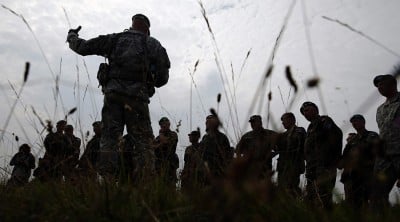Hungary to Host NATO Command Center

Hungary is planning to host a NATO command center alongside with other central European and eastern European countries. The center would plan military exercises and coordinate the actions of the Alliance’s rapid deployment forces in the case of emergencies.
The Hungarian government announced that the new command center’s personnel, called a NATO Force Integration Unit, would include 40 officers both from Hungary and other NATO member states with no combat units deployed there.
“Its task in peaceful times is to organize and plan international exercises and, in an emergency, the coordination of the NATO Reaction Force,” the government spokesman’s office told Reuters.
NATO military exercises in Scotland will jam GPS http://t.co/2Y8speuFBV pic.twitter.com/KnWjWSqcUg
— RT UK (@RTUKnews) October 2, 2015
NATO has already created similar command centers in Lithuania, Bulgaria, Estonia, Latvia, Poland and Romania.
The centers’ task would be in to coordinate the actions of the Alliance’s spearhead force which is to be fully operational in early 2016. The role of the new force will be discussed by the member states’ defense ministers in Brussels on October 8.
On its website, NATO said that the “rapid deployment of allied forces to the eastern part of the Alliance” could be necessary and the new system of command centers could effectively help with that.
‘The culture of ostracizing Russia continues’ – British MP http://t.co/Hn6cXYH2P5 pic.twitter.com/HJflZxiW85
— RT (@RT_com) October 2, 2015
At the same time, some eastern European members of the Alliance, such as Poland, would like the NATO spearhead force to focus on deterring a potential Russian offensive amid the growing tensions between Russia and the Western countries.
The new system of command centers in central and eastern Europe will not be the only move in what the Alliance called “assurance measures” launched in response to perceived “challenges” posed by Russia as NATO steps up its military presence along Russia’s borders.
On Friday, the Alliance started month-long military exercises in Lithuania called Baltic Piranha. The war games will witness 500 Lithuanian soldiers join forces with Belgian, American and Luxembourgian troops, with the total number of military involved amounting to some 1,000 soldiers and around 100 pieces of military equipment.
NATO’s Baltic Piranha ‘assurance drills’ kick off in Lithuania http://t.co/uk1kIZ4Otp pic.twitter.com/JOWEhlMuRN
— RT (@RT_com) October 2, 2015
At the same time, the US Air Force is starting preparations to transport B61 nuclear bombs to Germany’s Buchel Air Base, ZDF TV channel reports. The base has already acquired 20 nuclear weapons since 2007, according to the Royal United Services Institute.
The US is currently working on a new variant of the B61, Mod 12, which would be more accurate and have a smaller yield than the third and fourth modifications currently deployed in Europe.
US to station more nukes in Germany against Bundestag’s will – report http://t.co/OFk7ZR9Npc pic.twitter.com/p73JHyjyET
— RT (@RT_com) September 23, 2015
However, the US relies not only on its nuclear arsenal in countering the perceived ‘Russian threat’. It has also prepared for a possible hybrid war with Russia in Europe’s Baltic States, German media reports.
The report by Deutsche Wirtschafts Nachrichten (DWN) says all the NATO war games organized in the region by Washington are held with the intent of preparing for various military response scenarios.
The Pentagon has shifted its military thinking when it comes to Moscow, selecting Russia’s direct neighbors in the Baltic region as the battleground, DWN adds. Its plan includes using irregular troops and destabilizing the region via mass rallies as well as cyber-attacks on critical infrastructure.
US ‘preparing’ for hybrid warfare with Russia in Baltics – report http://t.co/45woMwXAPm pic.twitter.com/y0RAnTUKpp
— RT (@RT_com) September 26, 2015
Russia has repeatedly stated that it sees NATO expansion and constant military activity along its borders as hostile and destabilizing. Additionally, Russia also denounced the US decision to deploy new nuclear arms in Germany as it would disrupt the strategic balance in Europe.
“This is another step and unfortunately it is a very serious step towards increase of tensions on the European continent. Such actions cannot be described as a step towards stronger trust and greater stability,” President Vladimir Putin’s press secretary said.
#VIRAL: Kremlin promises ‘counter-steps’ in reply to US deploying nuclear weapons to Germany http://t.co/mfcfBJOfKd pic.twitter.com/itLSki0PYh
— RT (@RT_com) September 23, 2015

